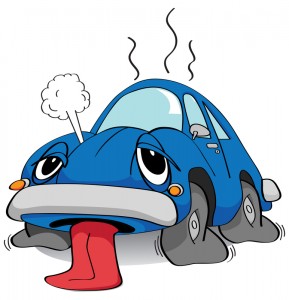There’s a wealth of misinformation circulating about automotive repair. Every time a question it asked, it seems like a new answer is given.
Add amateur mechanics and unethical auto repair shops to the already confusing conversation, and it’s tough to get a straight answer.
Not only could this result in you paying for unnecessary services, the wrong recommendation could cause extensive damage to your vehicle. That’s why Christian Brothers Automotive wants to set the record straight.
Last week, we explained how your car’s cooling system works and why it’s such an essential part of your vehicle’s operation. This week is the second installment in the Christian Brothers Automotive series on cooling system maintenance and repair.
We’ll correct 5 cooling system misconceptions and tell you the truth about your car.
Cooling System Myth #1: This system doesn’t need service
One common misconception is that the cooling system is a maintenance-free system. In certain vehicles, when coolant breaks down, it may cause rust and rust particles to become electrically charged. When this happens, the coolant can become highly corrosive. This can result in major damage to the engine and cooling system.
Others believe a vehicle’s coolant does not need to be flushed, but simply topped off. Similar to a car’s oil, coolant breaks down over time. If not serviced, old or broken-down coolant can wear down the engine or cause corrosion.
Cooling System Myth #2: A small coolant drip isn’t a big deal
A small bit of fluid on the garage floor may not seem important, but it’s a big deal. First, it’s against both state and federal laws to dump antifreeze and other hazardous substances into surface waters.
When you park your car on the street, that’s exactly what you’re doing. Rainwater washes the coolant into the storm drain, which then dumps these dangerous substances into your community’s water supply.
Second, glycol (or antifreeze) is very poisonous. It has a sweet taste that dogs and small children find irresistible. Letting it out of your car – one way or another – is a recipe for disaster. In addition to the health and environmental hazards, a leaking radiator will lead to cooling system failure.
If the radiator itself has a leak, the radiator will eventually split open and dump all remaining coolant. If the leak is in a hose, the hose will blow out. In other words, all kinds of nasty things can happen that will end up costing a lot more time and money than fixing a small leak when it’s first noticed.
Cooling System Myth #3: When your car is overheating, you should slow down
When a driver notices their car overheating, the first instinct is to pull over and turn off the engine. This is the wrong choice. Engine cooling is a combination of coolant flow and airflow across the radiator.
What should you do instead? Sometimes, the best solution is to increase vehicle speed (or engine speed) to provide more coolant flow, more airflow or both. Another trick is to turn your heater on full-blast.
This works because the heater is basically a cooling coil that dumps heat from the engine inside the cabin of the vehicle. If it’s hot outside, you will be uncomfortable. But, you’ll save the engine.
Cooling System Myth #4: All anti-freeze products are the same
While many auto mechanics wish this myth were true, it’s not. In fact, some car manufacturers will void the car warranty if you don’t use the specified fluid. Be sure to check your vehicle owner’s guide before you pour any old product into the cooling system. Like your oil, antifreeze is a vital fluid and it needs to be filled to the correct specification.
Likewise, many believe 100% antifreeze is necessary. Actually, straight antifreeze will freeze when the temperature drops low enough. While it may sound counter-intuitive, mixing the antifreeze with water lowers the risk of your coolant freezing in the winter.
Cooling System Myth #5: All you need to do is keep the coolant full
Many drivers are under the impression the coolant level is the only important factor. In actuality, the quality of the coolant is just as important. As we’ve already mentioned, your coolant will break down just like the motor oil or any other fluid in your vehicle. Because of this, it’s essential to perform periodic coolant flushes.
If you’re receiving a service that removes all the coolant (like a water pump replacement), it’s natural to think, and “All the coolant is out, why do I need a coolant flush?” But a flush does more than simply remove the fluid. During a flush, the built-up contaminants in the system are also removed.
All the scale deposits rust and particulates are thoroughly cleaned out and the entire system is scrubbed down with a detergent and protective conditioner. Keeping your cooling system well-maintained and full of high-quality coolant will protect your car against corrosion and future damage.
Your cooling system is a complex part of the vehicle’s function
With the right information, you can protect your vehicle and help your car drive stronger for longer.
If you have any questions about the cooling system or are in need of an inspection, call your local Christian Brothers Automotive. You’re sure to see the nice difference!

Top 5 Cooling System Maintenance Myths Busted
by
Tags:

Leave a Reply